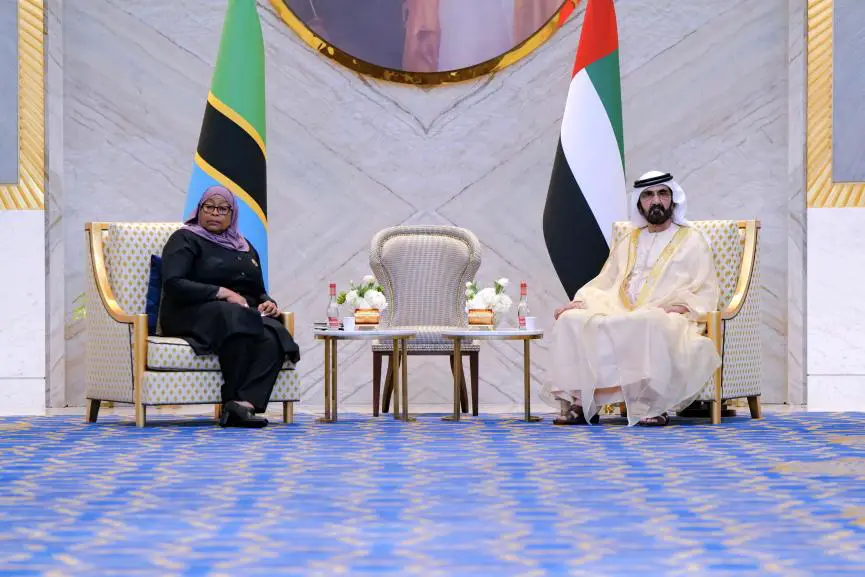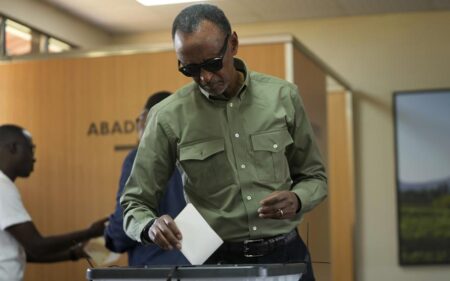Tanzania and Qatar have signed an MoU to end double taxation and strengthen trade and investment ties with the United Arab Emirates (UAE).
A media statement issued by the State House says the objective of the MoU is to ‘enhance trade and investment cooperation and partnership between business communities from Tanzania and Qatar.’
To strengthen trade and investment among the countries, the statement specifies several areas of priority, including tourism, hospitality, infrastructure and energy.
To witness the signing event, Tanzania president Samia Suluhu Hassan was present along with other high-ranking officials from Tanzania Mainland, the island of Zanzibar and the authorities from the chambers of Commerce of Qatar.
The actual signing was done by the President of Tanzania Chamber of Commerce, Industry and Agriculture (TCCIA), Paul Koyi, chairman of Zanzibar National Chamber of Commerce (ZNCC), Ali Suleiman Amour and First Vice-Chairman of Qatar Chamber of Commerce, Mohamed Bin Ahmed Twar Al Kuwari,
President Samia also met with Qatar’s Finance Minister, Ali bin Ahmed Al Kuwari. According to the State House document, the two leaders discussed the lingering matter of double taxation for goods exported and imported between the two countries, among other topics, all meant to help strengthen trade and investment.
Tanzania President Samia also held talks with Qatar’s Public Health Minister, Dr. Hanan Mohamed Al Kuwari, on how they can share expertise in emergency and trauma cases. She also met the Emir of Qatar, Sheikh Tamim bin Hamad Al Thani. She attended the World Innovation Summit for Health (WISH) at the Multaqa Education Centre in Doha where healthcare was discussed in view of global economic growth.
Also Read: Qatar Airways entry into Zimbabwe will boost economy

Tanzania-UAE growing trade ties
In this most recent pact, the United Arab Emirates (UAE) and Tanzania president Samia signed an agreement to avoid double taxation.
The pact prevents double taxation on the one hand and fights tax evasion on the other. By signing the deal, the two countries hope to strengthen tax cooperation between them and “avoid impeding the flow of trade and investment.”
Let’s first define double taxation to clarify what this deal means for the two countries. Double taxation, as the name suggests, occurs in the event that a tax charge or a particular good or service is charged two times i.e. by one entity to start with and then by another, in this case by two countries.
- Tanzania, Zanzibar and Qatar have signed MoU to strengthen trade and investment ties.
- United Arab Emirates (UAE) and Tanzania have signed an agreement to avoid double taxation.
- Tanzania President Samia holds talks with Qatar’s Public Health Minister to share expertise in emergency and trauma cases.
Also Read: Kenya and Portugal sign pact to avoid double taxation
Double taxation can also occur in income taxation, especially in international trade and investment say for instant a citizen from one country is earning a profit from a business in another country and they are charged income tax in their home country and again in the country where their business is in.
By agreeing to remove double taxation the countries also agree to remove barriers to bilateral investment and trade between one other. It is just as well because trade and investment between the two are growing.
Only recently the UAE renewable energy firm Masdar went into a deal with Tanzania to conduct several solar and wind power projects in the country. Similarly, the Emirates also signed several trade financing agreements with a few countries in West Africa as the UAE makes its mark in global economic growth.
Qatar is only the latest of the United Arab Emirates that Tanzania is making trade and investment deals with. In February this year, Tanzania participated at the World Expo Dubai 2020 to promote its products and opportunities.
The magnanimous expo attracted over 190 participating countries all converging in Dubai, in the United Arab Emirates, as of 1 October 2021 all through to 31 March 2022. The Expo was originally slated for 20 October 2020 to 10 April 2021, but had to be postponed due to the COVID-19 pandemic.
The event witnessed a record turnout of more than 24 million people in the span of six months, a significant implication for boosting global economic growth.
At the Expo, Tanzania was represented by several government institutions participating, including the Tanzania Trade Development Authority (TANTRADE), Ngorongoro Conservation Area Authority (NCAA), Tanzania National Parks Authority (TANAPA), Tanzania Investment Centre (TIC), Tanzania Tourist Board (TTB) and Tanzania Forest Services Agency (TFS).
Also Read: Rwanda step up efforts to attract Turkish, UAE investors
The organizers emphasized that Expo 2020 is meant to serve Africa’s interests, create opportunities for strengthened connections with the UAE, and boost global economic growth.
“…Africa is the future of global economic growth. While other continents saw slow to negative growth in their economies Africa countries’ economies were growing at double-digit levels. So African participation in Expo 2020 is seen as an important element for the success of the mega event,” said Reem Ibrahim Al Hashimi, the UAE Minister of State for International Cooperation and Director-General of Expo 2020 Dubai.
With less than five hours of flight time from Dubai to Kenya’s capital Nairobi, the UAE is very well positioned to provide Kenya with much-needed tourists to help re-boost the ailing industry.
Notably, tourists and business persons alike, have a wide range of flight options to and from Nairobi all scheduled at convenient times and routes. There is also a score of airlines that provide fast and efficient connectivity and frequency, including Kenya’s own Kenya Airways, UAE’s Emirates Airlines (from Dubai), Air Arabia (from Sharjah), and Etihad Airways (from Abu Dhabi).
Also Read: Qatar direct flights to Mombasa upgrades the city to another level
Tanzania is not the only East African Community (EAC) country seeking to strengthen trade and investment ties with the rich UAE. Only recently, Kenya, the largest economy in the EAC, set up an Embassy in Abu Dhabi and a Consulate General in Dubai. By so doing, Kenya makes it a lot easier for travellers to get visas hassle-free.
Kenya did not stop there, to ease the process even further, when persons from the UAE wish to travel to Kenya, they do not have to get visas in the UAE but rather, they can travel freely and get their visas upon arrival.
In an effort to increase tourism in Kenya, the country has also waived visa fees for children under 16 years of age, a tactical move that allows UAE citizens to travel and tour the country as a family.
Further still, Kenya has also removed taxes charged on UAE national carriers to attract more planes from the Arab Emirates, which translates to more tourists and trade. It did not stop there. Kenya also signed another pact with the UAE on double-taxation avoidance. Tanzania is now seeking a much similar deal.











